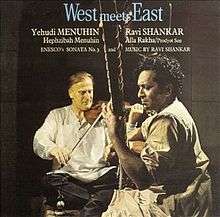West Meets East
| West Meets East | ||||
|---|---|---|---|---|
 | ||||
| Studio album by Yehudi Menuhin and Ravi Shankar | ||||
| Released | January 1967 | |||
| Recorded | 1966 | |||
| Genre | Hindustani classical | |||
| Length | 48:47 | |||
| Label | HMV, Angel | |||
| Yehudi Menuhin and Ravi Shankar chronology | ||||
| ||||
| Professional ratings | |
|---|---|
| Review scores | |
| Source | Rating |
| AllMusic | |
West Meets East is an album by American violinist Yehudi Menuhin and Indian sitar virtuoso Ravi Shankar, released in Britain in January 1967.[2] It was recorded following their successful duet in June 1966 at the Bath Musical Festival, where they had played some of the same material.[3]
The album was issued in America on EMI's Angel Records imprint in June 1967.[4] West Meets East was number 1 on Billboard's Best Selling Classical LP's list for eighteen weeks in 1967 and continued to top that chart through January the following year.[5] It also placed on the mainstream national chart (later the Billboard 200), where it peaked at number 161.[6] In February 1968, the album won the 1967 Grammy Award for Best Chamber Music Performance,[7][8] the first time that an Asian musician had won a Grammy.[9] This recognition coincided with a period of heightened interest in Indian classical music,[10] and particularly Shankar,[11] as Western pop and rock bands such as the Beatles, the Byrds, the Rolling Stones and Traffic all adopted sitar or other aspects of the genre into their sound.[12][13]
In July 1968, Angel Records announced that West Meets East was the fastest selling LP in the history of the label.[14] The album was the first in a trilogy of "West Meets East" collaborations by Menuhin and Shankar,[15] volumes two and three appearing in 1968 and 1976, respectively.[16] The friendship between the two musicians had begun in India in the early 1950s,[17] after which Menuhin had done much to introduce Western audiences to Indian music.[1][18]
Musical content
On the recording, the main performers are accompanied at various points by tabla player Alla Rakha; Menuhin's sister, pianist Hephzibah Menuhin; and Prodyot Sen, on tambura. In addition to Shankar's and Menuhin's liner notes on the album sleeve,[19] musician John Barham supplied a glossary, explaining musical terms such as alap, gat and tala.[20] At the Bath Festival, Barham had translated Shankar's interpretation of Raga Tilang into Western annotation for Menuhin's benefit.[21] When making West Meets East, Shankar rewrote this Tilang-based piece,[22] recording it with Menuhin as "Swara Kakali".[16] The album's opening selection is "Prabhati", a Shankar composition based on Raga Gunakali,[23] and played by Menuhin and Rakha.[16]
The fourth selection, filling side two in the LP format, is "Sonata for Violin & Piano No. 3 in A minor, Op. 25", featuring Hephzibah Menuhin.[20] This piece was written by Romanian composer George Enescu, who had been Yehudi Menuhin's teacher.[24]
Track listing
All selections by Ravi Shankar except where noted.
Side one
- "Prabhati" – 4:08
- "Raga Puriya Kalyan" – 11:45
- "Swara Kakali (based on Raga Tilang)" – 8:46
Side two
- "Sonata for Violin & Piano No. 3 in A minor, Op. 25" (George Enescu) – 24:08
Personnel
- Yehudi Menuhin – violin
- Ravi Shankar – sitar, musical arrangements
- Alla Rakha – tabla
- Hephzibah Menuhin – piano
- Prodyot Sen – tambura
See also
Citations
- 1 2 "Yehudi Menuhin and Ravi Shankar West Meets East", AllMusic (retrieved 1 December 2013).
- ↑ Shankar, Raga Mala, p. 323.
- ↑ Lavezzoli, pp. 7, 62–63.
- ↑ "New Album Releases". Billboard. 3 June 1967. p. 45. Retrieved 24 August 2015.
- ↑ Kirby, Fred (13 January 1968). "Mahler Takes Listings Crown From Beethoven". Billboard. p. 34. Retrieved 24 August 2015.
- ↑ "Ravi Shankar: Awards". AllMusic. Retrieved 24 August 2015.
- ↑ "Past Winners Search", grammy.com (retrieved 1 December 2013).
- ↑ Lavezzoli, pp. 8, 63.
- ↑ World Music: The Rough Guide, p. 109.
- ↑ Robert Shelton, "Indian Raga Music Gains in Popularity Across U.S.", New York Times, 20 December 1966 (retrieved 3 December 2013).
- ↑ Ken Hunt, "Ravi Shankar", AllMusic (retrieved 1 December 2013).
- ↑ Lavezzoli, pp. 7, 162, 174–75, 180.
- ↑ World Music: The Rough Guide, pp. 109–10.
- ↑ Staff writer (13 July 1968). "Angel's Follow LP on 'West'". Billboard. p. 30. Retrieved 24 August 2015.
- ↑ Reginald Massey, "Ravi Shankar obituary", The Guardian, 12 December 2012 (retrieved 1 December 2013).
- 1 2 3 Lavezzoli, p. 63.
- ↑ Shankar, My Music, My Life, p. 94.
- ↑ Lavezzoli, pp. 57–58, 60–61, 63.
- ↑ "Credits: Yehudi Menuhin and Ravi Shankar West Meets East", AllMusic (retrieved 1 December 2013).
- 1 2 Sleeve credits, West Meets East LP (HMV Records, 1966).
- ↑ Lavezzoli, p. 62.
- ↑ Sue C. Clark, "Ravi Shankar: The Rolling Stone Interview", Rolling Stone, 9 March 1968 (retrieved 1 December 2013).
- ↑ Shankar, My Music, My Life, p. 95.
- ↑ Lionel Rolfe, "West Meets East", Pasadena Weekly, 10 January 2013 (retrieved 1 December 2013).
Sources
- Peter Lavezzoli, The Dawn of Indian Music in the West, Continuum (New York, NY, 2006; ISBN 0-8264-2819-3).
- Ravi Shankar, My Music, My Life, Mandala Publishing (San Rafael, CA, 2007; ISBN 978-1-60109-005-8).
- Ravi Shankar, Raga Mala: The Autobiography of Ravi Shankar, Welcome Rain (New York, NY, 1999; ISBN 1-56649-104-5).
- World Music: The Rough Guide (Volume 2: Latin and North America, Caribbean, India, Asia and Pacific), Rough Guides/Penguin (London, 2000; ISBN 1-85828-636-0).